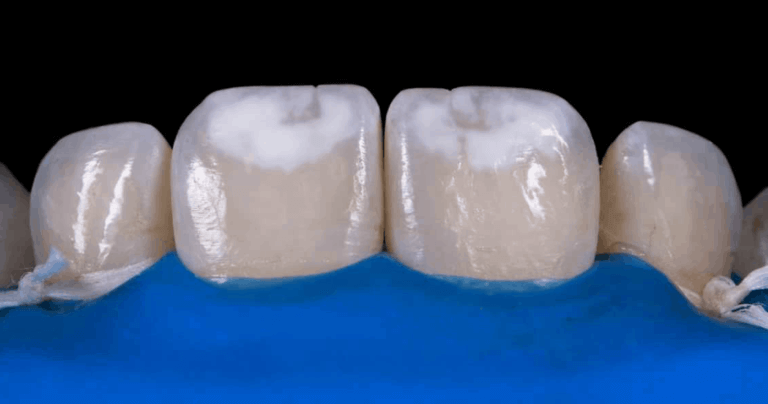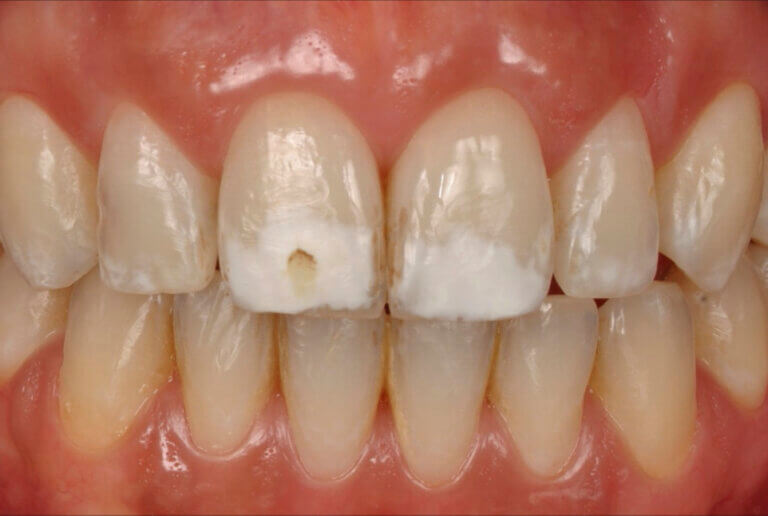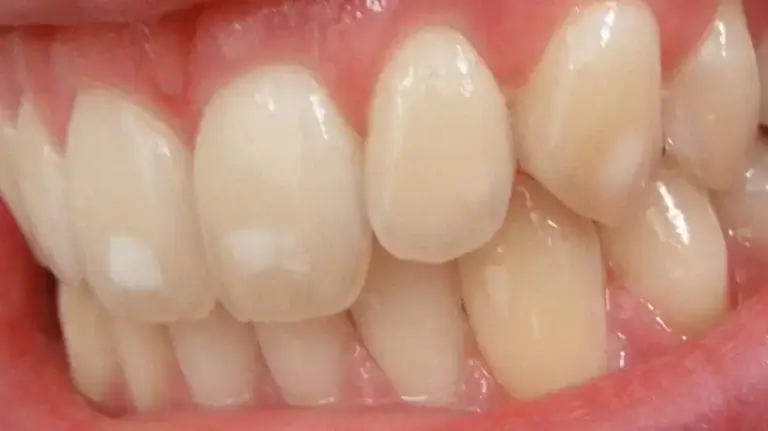White Spot Lesions

What Are White Spot Lesions?
White spot lesions, also known as enamel decalcifications, are areas of demineralized enamel on the surface of teeth. They appear as chalky white spots and are often an early indicator of tooth decay. These lesions occur when the enamel loses essential minerals like calcium and phosphate, making it more susceptible to further decay and damage.
Before you contact a Toronto dentist to examine White Spot Lesions, there are some things you should know as a patient:
- What Causes White Spot Lesions?
- Signs And Symptoms Of White Spot Lesions
- Treatment Options For White Spot Lesions
- How To Prevent White Spot Lesions
- Frequently Asked Questions About White Spot Lesions
If you have questions about White Spot Lesions or other dental problems, please contact us for more information.
What Causes White Spot Lesions?
Wondering why those pesky white spot lesions have made an appearance on your teeth? Several factors could contribute to their development:
- Poor Oral Hygiene: Insufficient brushing and flossing allow plaque and bacteria to build up, leading to enamel erosion.
- High-Sugar Diet: Sugary foods and drinks feed harmful bacteria, increasing acid production that wears down enamel.
- Acidic Foods and Beverages: Regular consumption of citrus fruits, sodas, and sports drinks can weaken enamel over time.
- Orthodontic Appliances: Braces can create hard-to-clean areas, trapping plaque and increasing the risk of white spot lesions.
- Dry Mouth: Reduced saliva flow limits the mouth’s natural ability to neutralize acids and protect enamel.
Understanding these underlying causes can help you make informed choices to prevent and manage white spot lesions, promoting better dental health in the long run. For more information about White Spot Lesions and how to treat them, please contact us.

Signs And Symptoms Of White Spot Lesions
Curious about whether those subtle changes on your teeth might be white spot lesions? Keep an eye out for these signs and symptoms:
- Visible White Spots: Noticeable chalky white patches or spots on the surface of your teeth indicate areas of demineralization and early-stage decay.
- Dark Spots: As white spot lesions progress, they may develop into darker spots or cavities, indicating more severe tooth decay.
- Rough Texture: White spot lesions can cause the affected areas of enamel to feel rough or uneven when running your tongue over them.
- Tooth Sensitivity: Increased sensitivity to hot or cold foods and beverages may occur as enamel demineralizes, exposing the sensitive inner layers of the tooth.
- Tooth Pain or Discomfort: In some cases, white spot lesions may cause mild pain or discomfort, particularly when consuming sugary or acidic foods.
Recognizing these signs early on allows for prompt intervention and treatment, preventing further damage to your teeth and preserving your oral health. For more information about White Spot Lesions and how to treat them, please contact us.

Treatment Options For White Spot Lesions
Dealing with white spot lesions involves various treatment options tailored to your specific needs:
- Icon Resin Infiltration: This minimally invasive treatment fills and seals white spot lesions with a special resin, restoring the tooth’s natural appearance and preventing further decay.
- Dental Fillings: For more advanced cases of white spot lesions or cavities, your dentist may recommend traditional dental fillings. These involve removing the decayed portion of the tooth and filling the space with a durable material such as composite resin to restore its structure and function.
- Composite Veneers: In cases where white spot lesions are more extensive or affect the aesthetics of your smile, composite veneers can be used to cover and conceal the affected teeth. These thin layers of composite resin are bonded to the front surface of the teeth, improving their appearance and providing added protection against decay.
- Porcelain Veneers: Similar to composite veneers, porcelain veneers are custom-made thin shells that cover the front surface of the teeth. They offer a more durable and natural-looking solution for concealing white spot lesions and enhancing the overall aesthetics of your smile.
- Fluoride Treatment: Dentists often use fluoride gels, varnishes, or mouth rinses to remineralize enamel and strengthen weak spots.
Discussing these treatment options with your dentist will help determine the most suitable approach for addressing your white spot lesions and restoring your dental health and confidence. For more information about White Spot Lesions and how to treat them, please contact us.
How To Prevent White Spot Lesions
Prevention is the best strategy for maintaining a healthy smile. Here’s how:
- Maintain Good Oral Hygiene: Brush your teeth at least twice a day and floss daily to remove plaque buildup and bacteria, preventing the formation of white spot lesions.
- Limit Sugary and Acidic Foods: Reduce your intake of sugary snacks and acidic beverages to minimize the risk of enamel erosion and demineralization, which can lead to white spot lesions.
- Use Fluoride Toothpaste: Choose a fluoride toothpaste to strengthen enamel and protect against decay. Fluoride helps remineralize weakened areas of enamel, making them more resistant to acid attacks.
- Attend Regular Dental Checkups: Visit your dentist for routine checkups and teeth cleanings every six months or as recommended. Regular dental exams allow for early detection and treatment of any potential white spot lesions before they progress.
- Stay Hydrated: Drink plenty of water throughout the day to promote saliva production, which helps neutralize acids in the mouth and remineralize enamel, reducing the risk of white spot lesions.
By incorporating these preventive measures into your daily oral care routine and lifestyle habits, you can significantly reduce your chances of developing white spot lesions and maintain a healthy, radiant smile for years to come. For more information about White Spot Lesions and how to treat them, please contact us.
Frequently Asked Questions About White Spot Lesions
- Are White Spot Lesions Reversible?
Yes, in the early stages, white spot lesions can often be reversed with fluoride treatments or remineralization strategies.
- Can Braces Cause White Spot Lesions?
Yes, braces can increase the risk of white spot lesions due to difficulty in cleaning around brackets. Maintaining excellent oral hygiene during orthodontic treatment is crucial.
- How Long Does Icon Resin Infiltration Last?
The results of Icon resin infiltration are long-lasting, often lasting several years with proper oral care.
- Do White Spot Lesions Always Lead to Cavities?
Not necessarily. With timely intervention and good oral care, the progression of white spot lesions to cavities can be halted or reversed.
By understanding the causes, signs, and treatments of white spot lesions, you can take proactive steps to maintain strong, healthy teeth. If you notice white spots on your teeth or have concerns about your oral health, contact us today to schedule an appointment.

